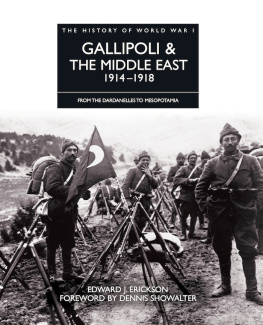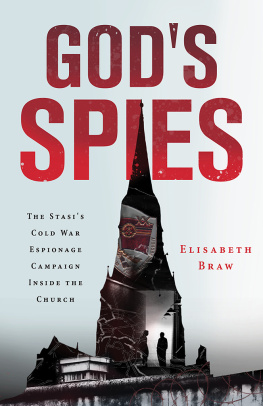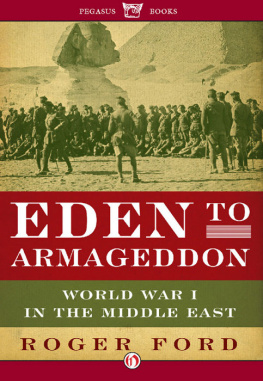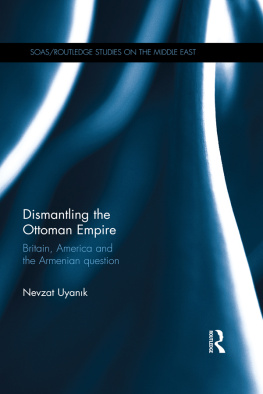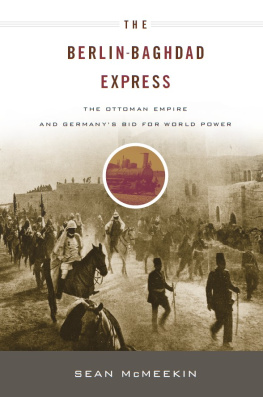
Curt Prfer was one of Germanys leading diplomats in the early twentieth century, serving the Kaisers government, the Weimar Republic and the Nazis. During World War I, he was stationed in the Middle East, where he attempted to orchestrate by various means, both official and informal Ottoman participation in the war on the side of the Germans.
Kevin Morrow is a researcher and translator with a wide range of experience amongst historical archives. He previously worked on the research team for Scott Andersons Lawrence in Arabia (2013).
This is an exceptional work of editing. Kevin Morrow has produced a very good translation with a flowing narrative supported by an amazing body of notes that will help readers both academics and general readership to understand the context. The diary of Curt Prfer, long forgotten, will shed light on previously little-known events that took place in the Middle East during the war and will help to reassess the German role in the region. This diary proves once more that the Middle Eastern front was not a sideshow.
Roberto Mazza, Lecturer at the University of Limerick and author of Jerusalem from the Ottomans to the British (I.B.Tauris, 2013) and Jerusalem in World War I: the Palestine Diary of a European Consul (I.B.Tauris, 2015).
In this remarkable book, Kevin Morrow reveals a crucial source: the diaries of important early twentieth-century diplomatic actor Curt Prfer. These illuminate the Ottoman preparations for the conquest of Egypt, the daily life in the desert and the relations between Turks and Germans during this period. The book offers readers a lively and unique description of what happened on the Palestinian front, and includes valuable information on the periods various nationalist movements, from Zionism to Arabism, and their relations with the Ottoman and German authorities. The detailed footnotes masterfully contextualize the entries and will enable readers to better understand the text. Germanys Covert War in the Middle East fills a significant gap in the history of the Great War and is essential reading for anyone hoping to understand the German and Turkish concerns in the Middle East during World War I, as well as the course of events on the Palestinian front.
M. Talha iek, Assistant Professor, Istanbul Medeniyet University
GERMANYS COVERT WAR IN THE MIDDLE EAST
Espionage, Propaganda and Diplomacy in World War I
Curt Prfer
Edited and Translated by
Kevin Morrow
Published in 2018 by
I.B.Tauris & Co. Ltd
London New York
www.ibtauris.com
Text copyright 2018 The Hoover Institution
English translation copyright 2018 Kevin Morrow
The right of Curt Prfer to be identified as the author of this work has been asserted by the estate of the author in accordance with the Copyright, Designs and Patents Act 1988.
All rights reserved. Except for brief quotations in a review, this book, or any part thereof, may not be reproduced, stored in or introduced into a retrieval system, or transmitted, in any form or by any means, electronic, mechanical, photocopying, recording or otherwise, without the prior written permission of the publisher.
Every attempt has been made to gain permission for the use of the images in this book. Any omissions will be rectified in future editions.
References to websites were correct at the time of writing.
International Library of Twentieth Century History 110
ISBN: 978 1 78453 143 0
eISBN: 978 1 78672 318 5
ePDF: 978 1 78673 318 4
A full CIP record for this book is available from the British Library
A full CIP record is available from the Library of Congress
Library of Congress Catalog Card Number: available
To my parents: you made me everything that I am.
To the Syrian refugees of Anjar and al Mafraq:
Godspeed and a swift homecoming.
CONTENTS
ACKNOWLEDGEMENTS AND NOTES ON SOURCES
I used three original sources in writing this book: the correspondence penned by Curt Prfer and his colleagues, now available in the German Foreign Office (Auswrtige Amt, or AA) microfilm collection at the National Archives of the US near Washington, DC; the AA microfilm collection at the Politisches Archiv des Auswrtigen Amtes (PAAA) in Berlin; and Prfers diaries written in often badly faded and occasionally illegible penciled script housed at Stanford Universitys Hoover Institution Archives.
Great effort was spent trying to identify the people and places named in Prfers writings. Many are seeing the light of day for the first time in a century. Others, unfortunately, must remain lost to history for now.
Innumerable archivists at several institutions deserve mention for their assistance, like Lewis Holland at the National Archives of the US, Martin Krger at the PAAA and Carol Leadenham of the Hoover Institution Archives. Additional thanks must go to Curt Prfers daughter-in-law, Trina Prufer, who kindly gave me access to Prfers personal records.
Several individuals rendered tremendous aid and encouragement during the writing of this book: Scott Anderson, who introduced me to Curt Prfer and his world through my research performed for his book Lawrence in Arabia; Roberto Mazza, professor of Ottoman history at the University of Limerick, who helped me launch this project; Lars Ldicke, Hanna Sahawneh, Karen Michener and Ebru Yagz Willie, who corrected my German, Arabic and Turkish translations. Dana Ayers, Cindy Fogleman, Alana Johnson, Danny Miller, John Murdoch, Lauren Ross and Ebru Yagz Willie helped underwrite the cost of my research.
NOTES ON THE TEXT, TRANSLITERATION AND TERMINOLOGY
Curt Prfer wrote primarily in German, sometimes in French, and occasionally used Italian, Arabic and Turkish words. In transliterating Arabic and Ottoman Turkish words, I have used the IJMES standard. Inevitably, the scholar of late Ottoman history must decide whether to refer to the Ottoman Empire and its peoples as Ottomans or Turks. By 1914, the Turkish rulers of the Ottoman Empire themselves were moving towards rejecting the empires ancient collective, multi-ethnic identity in favor of an increasingly mono-cultural, Turkish identity; most Westerners, including Prfer and his German colleagues, used the term Turks. In deference to historical usage, I will refer to the empires leaders (and the instruments of their will, such as the army) as Turks and the Empire as Ottoman.
ABBREVIATIONS
| AA | Auswrtige Amt |
| AWM | Australian War Memorial |
| BL | British Library |
| FA 300 | Fliegerabteilung 300 Pascha |
| HIA | Hoover Institution Archives, Stanford University |
| NAK | National Archives of the United Kingdom at Kew |
| NARA | National Archives and Records Administration (US) |
| NfO | Nachrichtenstelle fr den Orient |
| PAAA | Politische Archiv des Auswrtigen Amtes |
| SO | Special Organization |
| TPC | Trina Prufer Collection |


